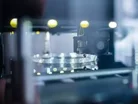Businesses are excited by 3D printing potential, but relaxed about risks

New research from law firm DMH Stallard has found that although a lot of companies are enthused about the potentials of 3D printing, they don’t yet see it as a threat to their intellectual property despite the fact that 3D printing can make counterfeiting goods easier.
In acquiring the data, DMH Stallard spoke to companies across many sectors which use additive manufacturing for prototypes and finished parts, plus software for 3D printing, design protection, and data logistics.
The research found that the major motivations for companies to use 3D printing fell into four main categories:
- Supply chain disruption: It allows companies to take back control of their supply chain by producing their own parts.
- Mass customisation: Being able to customise products without the need for expensive and dedicated tools.
- Reverse engineering: Not only does 3D printing allow the design and creation of customised products, it allows models to be created from products.
- Making the impossible possible: It allows the creation of products that other manufacturing methods would not have allowed.
Robert Ganpatsingh, Partner at DMH Stallard and one of the researchers, said: “Of the companies we spoke to, who all operated in a business-to-business environment, the majority believed that their IP would be safe if sensible precautions were taken to protect it. Although they did acknowledge that there was more danger to them at the bespoke end of the scale, where very small numbers of highly customised products are made.
“While this attitude may not cost them today, as 3D printing improves, so does the ability of counterfeiters to rip off IP which is hugely valuable to organisations. Companies need to take steps now to ensure that they are protected in the future as the technology develops.
“One of the most attractive things about 3D printing is that manufacturing businesses need only move data to the printer to enable local manufacturing. But this means whoever has that data has the keys to the castle. The UK develops innovative products that are the result of huge investments in research and development. Organisations need to protect their investment by making it as difficult as possible for counterfeiters to copy their products.”
The research report can be downloaded here.

